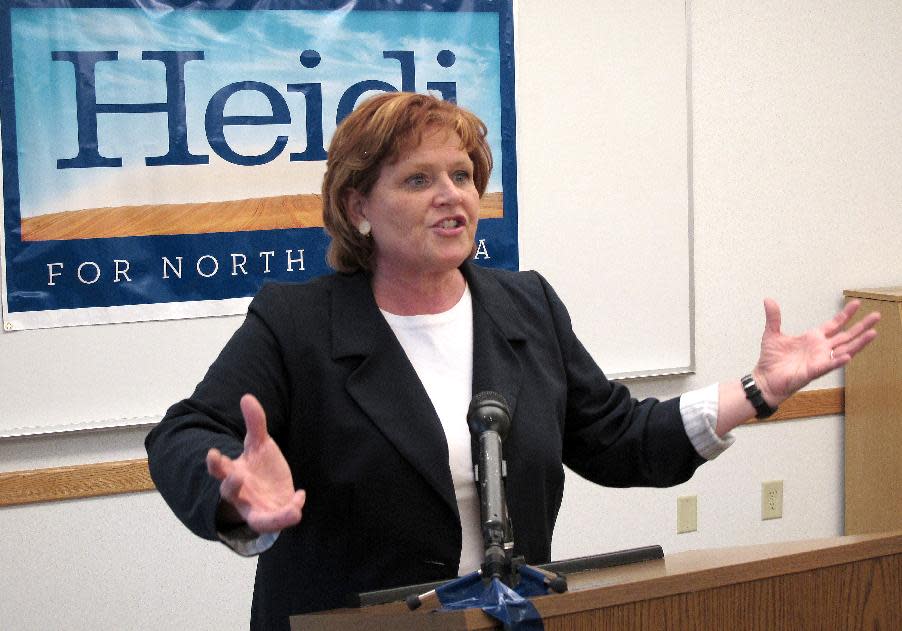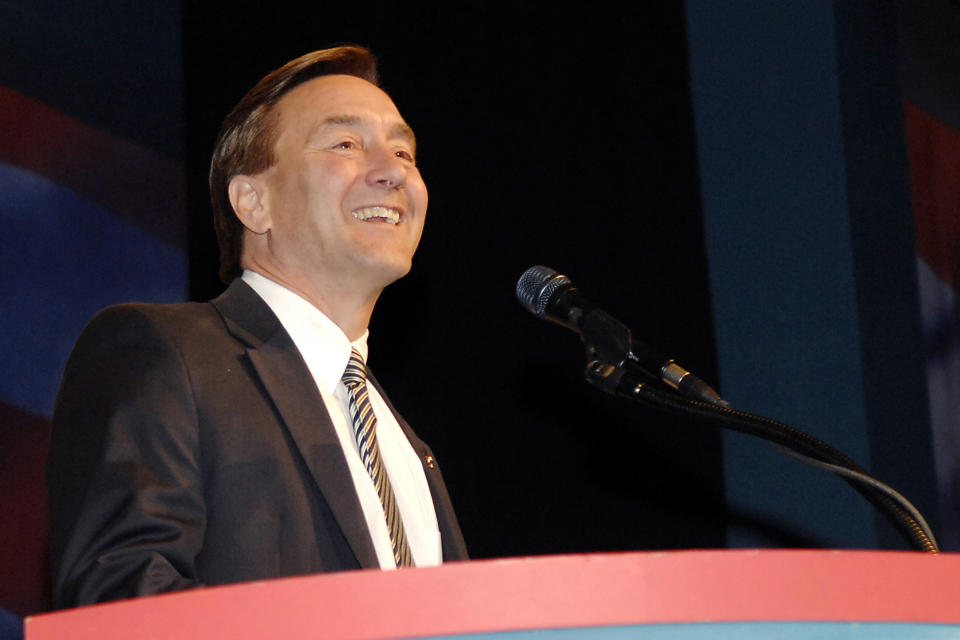Competitive Senate race shaping up in North Dakota
MINOT, N.D. (AP) — North Dakota's prosperity from an energy boom as the rest of the country slowly crawls out from under a collapsed economy is making a contest of a Senate race that Democrats had all but conceded.
Heidi Heitkamp, a former state attorney general with ties to the energy industry and a one-time candidate for governor, is perhaps the state's only Democrat who can prevent the seat being vacated by Democratic Sen. Kent Conrad from flipping to the GOP in November.
Heitkamp, 56, touts her success as attorney general in fighting new regulations on coal and her work for a natural gas and coal production company since leaving office. She keeps a healthy distance from her party's standard-bearer, criticizing President Barack Obama over the Keystone XL oil pipeline and complaining that he "hasn't done enough" to support the energy industry.
Republicans maintain that Heitkamp will still prove too liberal a candidate to keep Conrad's seat for Democrats. But they acknowledge it's a tighter race than they expected.
The GOP's candidate is Rep. Rick Berg, a successful real estate developer and longtime state legislator elected to the House just two years ago with strong tea party support.
North Dakota is an improbable battleground as both parties vie for control of the Senate. Republicans need to net four seats to take control, but strategists in both parties see few paths to a GOP majority that don't include North Dakota.
In a sign of the race's competitiveness, the Democratic Senatorial Campaign Committee recently began running ads in the state, as did Crossroads GPS, a policy and advocacy group led by Republican operative Karl Rove.
North Dakota is the election's atypical battleground in a sputtering economy.
The state is in the midst of an oil boom. Production has increased fivefold over the past five years and North Dakota now accounts for 9.1 percent of the nation's oil production, up from 2.3 percent just five years ago. Its natural gas and coal industries enjoy similar growth.
As a result, the state's per capita income is soaring, up 78 percent since 2000, when the average North Dakotan took in $25,592. Today the average is more than $45,000.
Both Senate candidates say they will work to continue the prosperity.
Berg, one of the more inconspicuous members of a large and outspoken GOP freshman class, starts the race as a favorite. He has outraised Heitkamp by about 2-to-1 and has nearly twice as much cash on hand as she does — $1.6 million to about $850,000.
North Dakota has a Republican governor, the GOP controls its Legislature, and in 2010 a Senate seat and a House seat, the one Berg now holds, both flipped to Republicans. The state hasn't voted for a Democratic president since Barry Goldwater was the Republican nominee in 1964.
Thus far, Berg, 52, is running on the same issues that helped him unseat longtime Democratic Rep. Earl Pomeroy in 2010: cutting the federal budget deficit and limiting government's power.
"We should show Washington how we do it in North Dakota," Berg said in a speech accepting his party's nomination at its state convention. "I'm running to stop the over-regulating of our economy and start growing it."
Democrats see key differences between this year and 2010. Heitkamp is the chief one.
While lagging behind Berg in raising money, she still has raised 10 times as much as the Democratic Senate candidate in 2010.
North Dakota is not a particularly expensive state in which to campaign. GOP Sen. John Hoeven raised slightly more than $3 million in his winning campaign in 2010.
Heitkamp is arguably better known than Berg. She's previously run for statewide office five times and helped lead a successful campaign to amend the North Dakota Constitution to restrict the ability of local governments to take private property for economic development projects.
Berg's first run for statewide office was in 2010, though he did serve as a leader in the Legislature. He certainly isn't as well-known as Hoeven, who was elected in 2010 with more than 75 percent of the vote after 10 years as governor.
In Congress, Berg has been a reliable vote for the GOP majority. He announced his Senate bid just months after he was elected to the House.
Berg "has not been in statewide office long enough to really create much of an impression, in terms of being a policymaker," said Mark Jendrysik, a professor of political science at the University of North Dakota. "But he certainly says the right things to appeal to the conservative Republican base."
Heitkamp has criticized Berg's vote for the House Republicans' budget blueprint and its proposed cuts to Medicare and federal crop insurance programs. Berg defends his vote, calls the budget targets "suggestions" and implies that he will protect North Dakota's interests.
Heitkamp has also pushed her ties to the state's energy industry. Since leaving office she's served as a director at Dakota Gas, a natural gas and coal company. Like Berg, she supports hydraulic fracturing, or "fracking," the exploration technique that has led to a boom in oil production in western North Dakota.
At a recent energy-themed campaign event in Minot, she criticized Obama as dithering on Keystone, the proposed pipeline for carrying oil from Canada to Texas Gulf Coast refineries. "So we're going to wait until we have a better economy and have more costs?" she said. "You look at it now, and it makes perfect sense."
In an interview, Heitkamp made it clear she intends to keep her distance from Obama.
"I think he's failed in the one test America had for him, which was to unite the country," she told The Associated Press. "I think he needed to be more hands-on. ... I don't think he's done enough to think broadly and come up with solutions that would engage both sides in a reasonable dialogue."
Republicans say Heitkamp's tough talk on Obama is an election-year conversion and predict her past support for his health care overhaul and candidacy in 2008 will be her undoing. The latest Crossroads ad, for instance, targets her support of Obama's health care plan.
Voters, however, say they're most concerned with maintaining North Dakota's economic success.
Jay Elkin, who farms near Taylor in Stark County in southwestern North Dakota, said he's likely to vote for Berg because he "understands business, he's a successful businessman and he's been involved in government and knows his way around."
Scott Shivley, who ranches near Velva, in north-central North Dakota, came to a Heitkamp campaign event in Minot to hear more about her energy ideas. He hasn't decided whom he will support but said balancing energy development with other needs is critical.
"The energy development is toughest on people who are on fixed wages, living in towns like Minot and Williston," he said.
___
Jackson reported from Washington.



